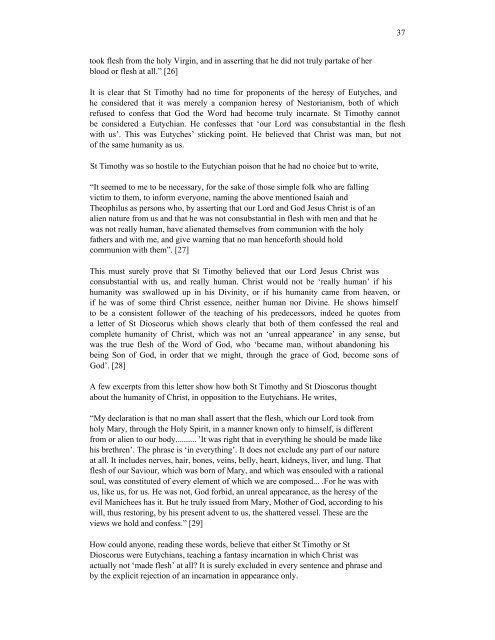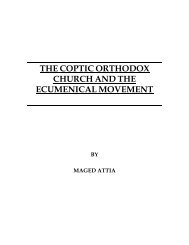Coptic interpretations of the Fourth Ecumenical Council - Saint Mina ...
Coptic interpretations of the Fourth Ecumenical Council - Saint Mina ...
Coptic interpretations of the Fourth Ecumenical Council - Saint Mina ...
Create successful ePaper yourself
Turn your PDF publications into a flip-book with our unique Google optimized e-Paper software.
took flesh from <strong>the</strong> holy Virgin, and in asserting that he did not truly partake <strong>of</strong> her<br />
blood or flesh at all.” [26]<br />
It is clear that St Timothy had no time for proponents <strong>of</strong> <strong>the</strong> heresy <strong>of</strong> Eutyches, and<br />
he considered that it was merely a companion heresy <strong>of</strong> Nestorianism, both <strong>of</strong> which<br />
refused to confess that God <strong>the</strong> Word had become truly incarnate. St Timothy cannot<br />
be considered a Eutychian. He confesses that ‘our Lord was consubstantial in <strong>the</strong> flesh<br />
with us’. This was Eutyches’ sticking point. He believed that Christ was man, but not<br />
<strong>of</strong> <strong>the</strong> same humanity as us.<br />
St Timothy was so hostile to <strong>the</strong> Eutychian poison that he had no choice but to write,<br />
“It seemed to me to be necessary, for <strong>the</strong> sake <strong>of</strong> those simple folk who are falling<br />
victim to <strong>the</strong>m, to inform everyone, naming <strong>the</strong> above mentioned Isaiah and<br />
Theophilus as persons who, by asserting that our Lord and God Jesus Christ is <strong>of</strong> an<br />
alien nature from us and that he was not consubstantial in flesh with men and that he<br />
was not really human, have alienated <strong>the</strong>mselves from communion with <strong>the</strong> holy<br />
fa<strong>the</strong>rs and with me, and give warning that no man henceforth should hold<br />
communion with <strong>the</strong>m”. [27]<br />
This must surely prove that St Timothy believed that our Lord Jesus Christ was<br />
consubstantial with us, and really human. Christ would not be ‘really human’ if his<br />
humanity was swallowed up in his Divinity, or if his humanity came from heaven, or<br />
if he was <strong>of</strong> some third Christ essence, nei<strong>the</strong>r human nor Divine. He shows himself<br />
to be a consistent follower <strong>of</strong> <strong>the</strong> teaching <strong>of</strong> his predecessors, indeed he quotes from<br />
a letter <strong>of</strong> St Dioscorus which shows clearly that both <strong>of</strong> <strong>the</strong>m confessed <strong>the</strong> real and<br />
complete humanity <strong>of</strong> Christ, which was not an ‘unreal appearance’ in any sense, but<br />
was <strong>the</strong> true flesh <strong>of</strong> <strong>the</strong> Word <strong>of</strong> God, who ‘became man, without abandoning his<br />
being Son <strong>of</strong> God, in order that we might, through <strong>the</strong> grace <strong>of</strong> God, become sons <strong>of</strong><br />
God’. [28]<br />
A few excerpts from this letter show how both St Timothy and St Dioscorus thought<br />
about <strong>the</strong> humanity <strong>of</strong> Christ, in opposition to <strong>the</strong> Eutychians. He writes,<br />
“My declaration is that no man shall assert that <strong>the</strong> flesh, which our Lord took from<br />
holy Mary, through <strong>the</strong> Holy Spirit, in a manner known only to himself, is different<br />
from or alien to our body.......... ’It was right that in everything he should be made like<br />
his brethren’. The phrase is ‘in everything’. It does not exclude any part <strong>of</strong> our nature<br />
at all. It includes nerves, hair, bones, veins, belly, heart, kidneys, liver, and lung. That<br />
flesh <strong>of</strong> our Saviour, which was born <strong>of</strong> Mary, and which was ensouled with a rational<br />
soul, was constituted <strong>of</strong> every element <strong>of</strong> which we are composed... .For he was with<br />
us, like us, for us. He was not, God forbid, an unreal appearance, as <strong>the</strong> heresy <strong>of</strong> <strong>the</strong><br />
evil Manichees has it. But he truly issued from Mary, Mo<strong>the</strong>r <strong>of</strong> God, according to his<br />
will, thus restoring, by his present advent to us, <strong>the</strong> shattered vessel. These are <strong>the</strong><br />
views we hold and confess.” [29]<br />
How could anyone, reading <strong>the</strong>se words, believe that ei<strong>the</strong>r St Timothy or St<br />
Dioscorus were Eutychians, teaching a fantasy incarnation in which Christ was<br />
actually not ‘made flesh’ at all? It is surely excluded in every sentence and phrase and<br />
by <strong>the</strong> explicit rejection <strong>of</strong> an incarnation in appearance only.<br />
37








